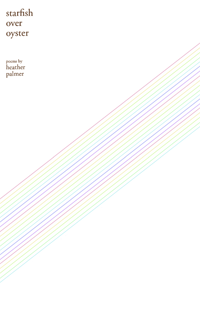 Starfish Over Oyster
Starfish Over Oyster
by Heather Palmer
Love Symbol Press, May 2013
60 pages / $12 ($1 PDF) Buy from Love Symbol Press
If you didn’t know how a starfish eats an oyster it does it like this,
“…the starfish’s mouth, which is located under its body, present a problem, it is smaller than an oyster. And the oyster presents another problem; it is protected by a hard shell. So when a starfish finds an oyster, it climbs on top of it and locks its many arms around the oyster’s shell, then tugs on the shell until the oyster is too tired to hold it closed anymore. When the shell opens, the starfish turns its stomach inside out, drops it over the oyster’s body, then draws it in again when the oyster is nearly digested.”
(from big site of amazing facts)
There’s no description of the act itself in Heather Palmer’s Starfish Over Oyster (except the reference in the title) but I’ll be damned if it isn’t a great metaphor for a book about hunger control, voice and violence. Starfish Over Oyster takes place in the mouth and the stomach. Heather Palmer writes like a shotgun blast and a jawbreaker. There’s a burst of ideas tucked into an intimate shell you have to suck on. Each line is compact and dangerous; some slip by while others kept me rereading them or turning back to them pages later.
Visually the book is beautiful. The layout looks perfect. Everything seems so precise, largely due to the pages’ ample negative space. The poems themselves, flush left and right, look like constrained little packages, small but dangerous. That being said, Starfish Over Oyster takes time to process; there’s no fat in the language and the subject matter is dark. It’s about a girl consumed by a city, her father, and hunger itself.
urbanity for her ready-meal
nothing will city a justified
stomach refuse curses the fruit
bowl
The city is recurring and important. It becomes a token for control, mastery and dominance. This theme is reaffirmed with the idea of a sort of edible Darwinism. Again starfish eating oysters. One has power, the other is being sucked open.
its eaters but only eaters know they
consume as they until Until one eats
whatever one sees on the plate not
thinking this is not them this will not sate
In later pages, the book begins to take a more discernible narrative structure, similar to Palmer’s previous book Compliments of Us (Spork Press). Forget any kind of comfortable solid ground though, it’s still a floaty dream world. Palmer’s protagonist is innocent (if not silent) in a world of perpetrators, including her father and “the dietician” and “the seamstress.” Interesting enough that both occupations measure the body and its weight; both are interested in restraining hunger.
Certainly hunger looms over the book. Starvation even.
Hunger is in almost every poem. The girl lives hunger, and it embodies her.
Why is the narrator so hungry?
The breakthrough for me was when I abstracted hunger. I started to think about craving for any number of things. What about our own personal hungers? Are they for food or something else?
Illness is addressed and it becomes unclear whether the girl’s illness is legitimate or a ruse by her father and his cohorts because her treatment of herself is so odd and unscientific:
repeat I heal disease in days
There seems to be something silly about the girl’s solution to her illness, maybe her father is right, maybe she does need help.
There’s a childlike quality to the book too, one that makes the reader and protagonist feel isolated and vulnerable but also content. The outside world seems so big and we are held with the girl and her small things:
make with sticks and mud a
box I wear like a hat to see
through the hat I think
differences and middles not
(Spoiler alert!) The girl gets her tongue out. She has to create language again. Like Compliments of Us (a book about triplets drifting into separate identities) Palmer is concerned with the development of perception. Who perceives illness and what their motivation for doing so is. Who goes along with that definition after it is created. How (even good–intentioned) stewardship changes the identity of the child/person being protected.
***
Wyatt Sparks lives in Chicago. His writing is featured or forthcoming in The Small Press Book Review, Banango Street and some lit mags.
Tags: Heather Palmer, Love Symbol Press, Starfish Over Oyster, Wyatt Sparks
